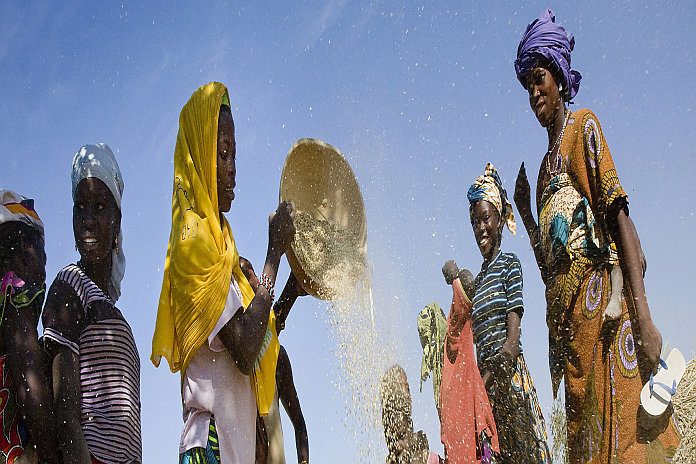By David Lipton
Across sub-Saharan Africa, a visit to a school offers both a vision of hope for the future and a reminder of the difficulties in attaining that vision. My recent visit to Sierra Leone and Niger brought this duality into sharp focus.
In Sierra Leone, classrooms at the Regent Square Municipal School showcase the government’s ambitious Free Quality Education program that aims to build on the country’s most precious resource—its children. There, eager students are attentive and diligent, but their education is constrained by large classes, overburdened and undertrained teachers, and a shortage of educational materials.
Meanwhile, in Niger, there is also a great drive for change. At a research center on the edge of the Sahel Desert, scientists are working on high-tech solutions to tackle malaria and climate change. But only a few miles away, students of all ages are getting basic education in schoolhouses made of straw, in classrooms with blackboards but few books.
Education and technology to drive change
Despite the challenges, what left the strongest impression was the focus on education as the driver of change, and the openness to use technology to achieve that. It is a picture that offers promise for the future—especially if these countries can find new sources of funding at home and from abroad, and make imaginative use of technology to overcome resource shortfalls.
What left the strongest impression was the focus on education as the driver of change.
Sierra Leone emerged from a decade of civil war in 2002 and embarked on the road to recovery. It received $1.6 billion of debt relief and began mining massive iron ore deposits. Then, in 2014, Ebola devastated the country, along with neighboring Guinea and Liberia amid a collapse of global commodity prices. Sierra Leoneans now must make up for lost time.
Today, the government’s ambitious development program focuses on investing in infrastructure and human capital. Technology will be a key element of the plan; for example, using digitalization to evaluate educational progress. Minister for Basic and Senior Secondary Education, David Moinina Sengeh (who is also the government’s Chief Innovation Officer), is one of Africa’s leading intellectual lights. A Massachusetts Institute of Technology PhD who led artificial intelligence work at IBM, he directs the education portfolio, which is so essential for a country where over 40 percent of the population is under 15 years of age.
Investing for the future
Investing in the country’s children and their education lies at the heart of Sierra Leone’s national development plan. This effort has the potential to raise GDP by 40 percent in the coming decades and to reduce income inequality. That would make a big difference in a country where per capita GDP remains little more than $500, and over half the population lives in poverty.
But how does a country secure the means to invest? A key task is to raise taxes in an evenhanded way and make government spending more effective. Efforts to strengthen governance (including tackling corruption) will help on both scores. This is also one area where the IMF is working with Sierra Leone, providing training and other concrete support in areas such as revenue mobilization and tax management. Interestingly, Sierra Leone is addressing some of these problems by creating technological solutions using AI and machine learning.
While the international community stepped up during the Ebola crisis, in more recent years the level of aid has fallen short of past efforts. For example, Rwanda and Mozambique received grant aid amounting to around 8-9 percent of GDP in the decade after the end of their civil conflicts. Yet in Sierra Leone today, such assistance has fallen to 2-3 percent of GDP.
Challenges facing Niger
Niger is also facing daunting challenges. It has experienced strong growth in recent years, and crude oil exports are scheduled to begin in 2022. But with the world’s highest population growth rate (3.8 percent, with more than seven children per mother, and high child mortality), developing the nascent private sector and creating jobs is the top priority.
Worse yet, Niger faces two existential threats: military conflict and climate change. These are issues that it shares with neighbors across the Sahel.
Armed conflict is increasingly encroaching on Niger from terrorist groups from across its borders with Mali, Burkina Faso and Nigeria. Economically, for a country whose resources already are stretched thin, the need for high-security expenditures complicates public finances, tying up money that otherwise could be used for Niger’s development.
As a predominantly agricultural economy that depends on modest annual rainfall, climate change is an ever-present reality for Niger. Temperatures in the Sahel are climbing 1.5 times faster than the global average, making rainfall erratic and wet seasons shorter. The UN estimates that 80 percent of the Sahel’s farmland has become degraded.
Armed conflict and climate change are issues that should register with governments in advanced economies that are concerned about the rise of terrorism in North Africa and the flow of migrants from the region. There are common interests that link economic development and security, especially in Europe.
From aspirations to reality
Countries like Niger and Sierra Leone simply cannot be expected to go it alone. The UN Sustainable Development Goals depend on mobilizing both domestic and international resources to achieve the lofty targets established by the international community.
All it takes is a visit at the grassroots to understand how strong the aspirations are, and how important each advance can be. With added resources, these countries could accomplish even more, and make their aspirations a reality.
![]()






